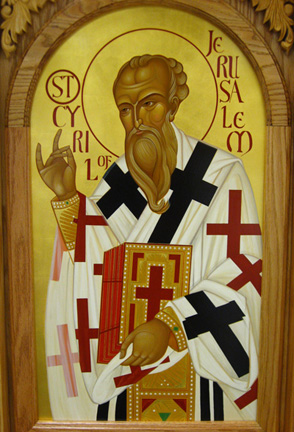Online Edition: November 2010
Vol. XVI, No. 8
Saint Cyril of Jerusalem on the Creed

Icon from the iconostasis of St. Cyril of Jerusalem Orthodox Church,
The Woodlands, Texas. Iconographer: John Lickwar
(Used wth permission)
Cyril became Bishop of Jerusalem ca. 350, during the years of Arian controversy that persisted after the first ecumenical Council of Nicea, convened by the emperor Constantine in 325. Cyril came to accept wholeheartedly the Nicene Creed’s definition of the divinity of Christ as “consubstantial” with God the Father. He attended the First Council of Constantinople in 381. Of his many writings, Cyril’s twenty-four famous catecheses (lectures on aspects of the faith), which he delivered as bishop in about 350, have been preserved. The first five of the catecheses concern 1) the prerequisites for Baptism, 2) repentance and remission of sins, 3) the Sacrament of Baptism, 4) ten key points of doctrine, and 5) on faith and the Creed, or Symbol of Faith.
Saint Cyril (ca. 315-387) was proclaimed a Doctor of the Church by Pope Leo XIII in 1883. Following is an excerpt from his Catechesis No. 5 on the Creed, §§12 and 13.
***
But in learning the Faith and in professing it, acquire and keep that only, which is now delivered to you by the Church, and which has been built up strongly out of all the Scriptures. For since all cannot read the Scriptures, some being hindered as to the knowledge of them by want of learning, and others by a want of leisure, in order that the soul may not perish from ignorance, we comprise the whole doctrine of the Faith in a few lines. This summary I wish you both to commit to memory when I recite it, and to rehearse it with all diligence among yourselves, not writing it out on paper, but engraving it by the memory upon your heart, taking care while you rehearse it that no catechumen chance to overhear the things which have been delivered to you.
I wish you also to keep this as a provision through the whole course of your life, and beside this to receive no other, neither if we ourselves should change and contradict our present teaching, nor if an adverse angel, transformed into an angel of light (II Corinthians 11:14) should wish to lead you astray. For though we or an angel from heaven preach to you any other gospel than that you have received, let him be to you anathema. (Galatians 1:8-9)
So for the present listen while I simply say the Creed, and commit it to memory; but at the proper season expect the confirmation out of Holy Scripture of each part of the contents. For the articles of the Faith were not composed as seemed good to men; but the most important points collected out of all the Scripture make up one complete teaching of the Faith. And just as the mustard seed in one small grain contains many branches, so also this Faith has embraced in few words all the knowledge of godliness in the Old and New Testaments. Take heed then, brethren, and hold fast the traditions which you now receive, and write them on the table of your heart. (§12)
Guard them with reverence, lest per chance the enemy despoil any who have grown slack; or lest some heretic pervert any of the truths delivered to you. For faith is like putting money into the bank, even as we have now done; but from you God requires the accounts of the deposit. I charge you, as the Apostle says, before God who quickens all things, and Christ Jesus, who before Pontius Pilate witnessed the good confession, that you keep this faith which is committed to you, without spot, until the appearing of our Lord Jesus Christ.
A treasure of life has now been committed to you, and the Master demands the deposit at His appearing, “which in His own times He shall show, Who is the blessed and only Potentate, the King of kings, and Lord of lords; Who only has immortality, dwelling in light which no man can approach unto; Whom no man has seen nor can see. To Whom be glory, honor and power for ever and ever. Amen”. [I Timothy 6:15-16] (§13)
***
Translated by Edwin Hamilton Gifford. From Nicene and Post-Nicene Fathers, Second Series, Vol. 7. Edited by Philip Schaff and Henry Wace. (Buffalo, NY: Christian Literature Publishing Co.,1894.) Revised and edited by Kevin Knight for New Advent. Reprinted with permission. (Complete text: newadvent.org/fathers/310105.htm).
***
*



